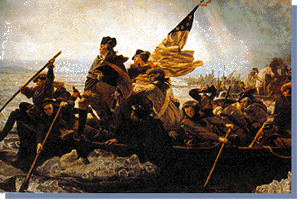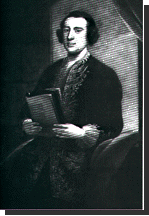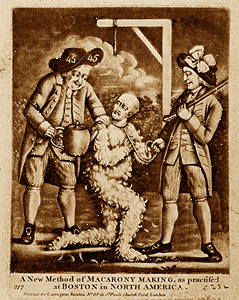![]()
![]()

![]()
![]()
![]()
![]()
 |
In January of
1767, during the consideration of the House of Commons of the estimated
cost of maintaining the British army in the colonies for the current year,
George Grenville moved
"That the troops to be kept up in America shou'd be Paid by the Colonies respectively for whose defence & benefit they were Employ'd." Charles Townshend, Chancellor of the Exchequer stated that he too "approved of our taxing the Colonies so as to provide for their own safety and preservation," and "by which the Colonies should be taxed conformable to their abilities, in a manner that should be least burdomsome and most efficacious." The Townshend Acts, British legislation intended to raise revenue, tighten customs enforcement, and assert imperial authority in America, were sponsored by Chancellor of the Exchequer Charles Townshend, (right - 1725-67) and enacted on June 29, 1767. The key statute levied import duties on glass, lead, paint, paper, and tea. Its purpose was to provide salaries for some colonial officials so that the provincial assemblies could not coerce them by withholding wages. |
| Other bills authorized
blank search warrants called Writs of Assistance, created three additional
vice-admiralty courts, which operated without juries, established a Board
of Customs Commissioners headquartered in Boston, and suspended the New
York assembly for not complying with the Quartering Act of 1765.
Parliament also passed the New York Restraining Act, which, in effect,
suspended the provincial legislature until it provided is Majesty's troops
with all such necessaries as required by British law. Americans protested
the Townshend duties, as they had the earlier Stamp Act, with constitutional
petitions, boycotts, and violence to even include "tar and feathering"
(left). They now rejected all forms of parliamentary taxation, whether
external duties on imports or internal taxes like the stamp levies.
After colonists began to boycott British goods, Parliament altered the
revenue measure on March 1770. Duties on all items except tea were
repealed. The tea tax was retained because it was the most lucrative and
to
show Americans that Parliament still had the right to tax them. |
 |
![]()